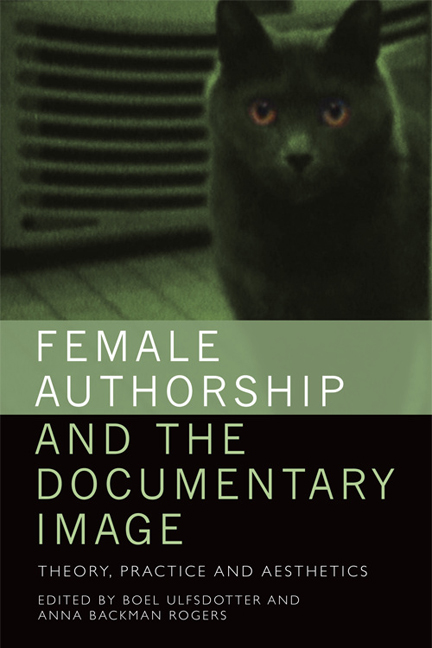Book contents
- Frontmatter
- Contents
- List of Illustrations
- Notes on the Contributors
- Foreword
- Introduction
- PART ONE DOCUMENTARY PRACTICES
- PART TWO DOCUMENTARY THEORIES
- PART THREE FEMALE AUTHORSHIP AND GLOBAL IDENTITIES
- ‘Being a Woman Documentary Maker in Taiwan’ – An interview with Singing Chen and Wuna Wu
- Select Bibliography
- Index
5 - Speaking About or Speaking Nearby? Documentary Practice and Female Authorship in the films of Kim Longinotto
Published online by Cambridge University Press: 05 May 2021
- Frontmatter
- Contents
- List of Illustrations
- Notes on the Contributors
- Foreword
- Introduction
- PART ONE DOCUMENTARY PRACTICES
- PART TWO DOCUMENTARY THEORIES
- PART THREE FEMALE AUTHORSHIP AND GLOBAL IDENTITIES
- ‘Being a Woman Documentary Maker in Taiwan’ – An interview with Singing Chen and Wuna Wu
- Select Bibliography
- Index
Summary
Kim Longinotto's female authorship has long been recognised for its engagement with ‘transnational feminism’ because her films focus on women subjects in a variety of non-Western contexts. Patricia White has specifically identified Longinotto's practice as ‘transnational’ rather than ‘globalising’, a recognition still relevant for this analysis of the complexity and struggle of these cross-cultural relationships. This article wishes to explore these ideas further through Longinotto's specific adaptation of the documentary form, returning to these difficulties of speaking ‘about’ or speaking ‘nearby’ women situated in other cultures, an idea drawn from the writings of Trinh T. Minhha. A particular focus is on how Longinotto's work is uniquely placed in its control of emotion, apparently combining a rallying cry against social oppression while still retaining an affective confessional intimacy. Her films have borne remarkable witness to a wide variety of hidden voices, the witnessing of the ‘outsiders or the disenfranchised’, according to Belinda Smaill. These include those caught in systems of power, such as the girls undergoing female genital mutilation in Kenya (The Day I Will Never Forget, 2002) or women seeking divorce in Iran (Divorce Iranian Style, 1998). There are the voices of a community: women working with abused and traumatised children in South Africa (Rough Aunties, 2008) or living as men in Japan (Shinjuku Boys, 1995). In certain films, women leaders emerge, such as Vera Ngassa, a lawyer prosecuting male and female abusers in Cameroon (Sisters-in-Law, 2005) or Indian women's rights campaigner Sampat Pal in Pink Saris (2010). Finally, in an unusual American setting, she follows community activist Brenda Myers-Powell, who works among prostitutes and vulnerable young women in Chicago (Dreamcatcher, 2015).
Longinotto's focus on injustice earned her the prestigious BBC Grierson Trustees Award in 2015. The trust characterised her as follows:
The creator of numerous ground-breaking films which focus on and explore the lives of women across the globe, throughout her career she has consistently given voice to those who have no voice living in some of the world's most repressive and hostile societies.
This prevailing perception of Longinotto's work raises a question about the ‘asymmetrical power relations’ that Inderpal Grewel and Caren Kaplan recognised as needing persistent scholarly attention.
- Type
- Chapter
- Information
- Female Authorship and the Documentary ImageTheory, Practice and Aesthetics, pp. 90 - 106Publisher: Edinburgh University PressPrint publication year: 2018



